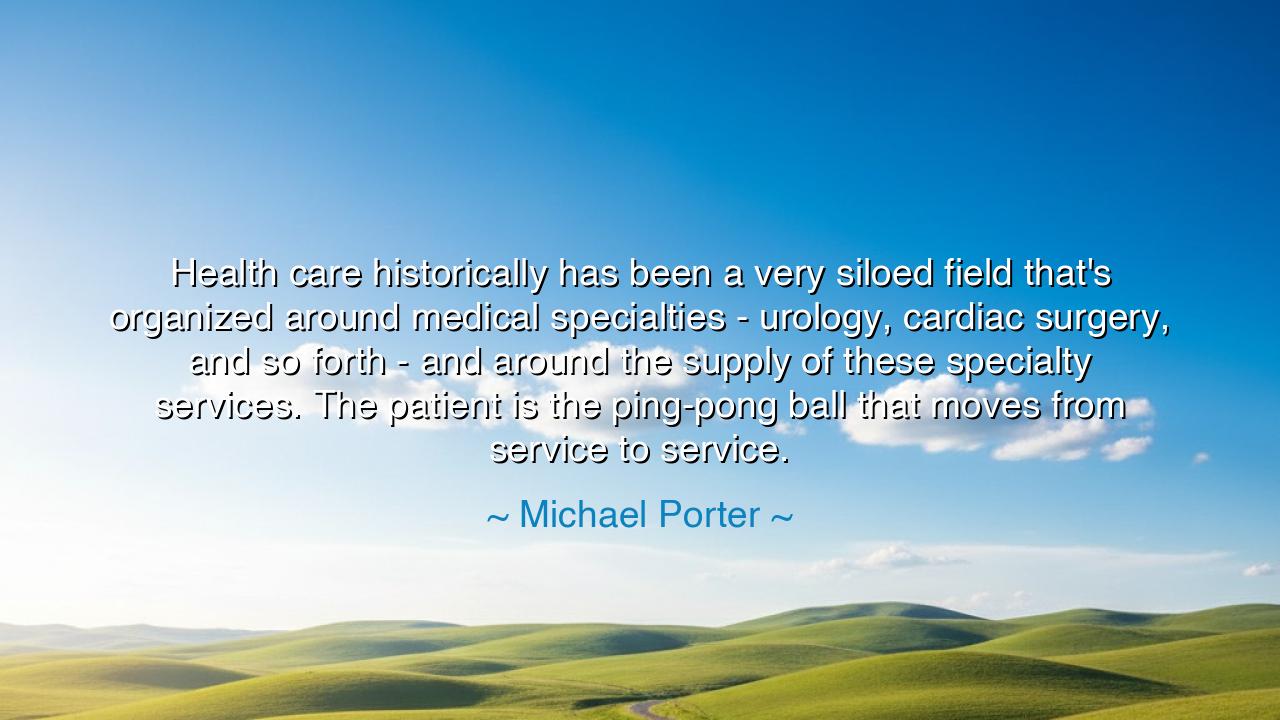
Health care historically has been a very siloed field that's
Health care historically has been a very siloed field that's organized around medical specialties - urology, cardiac surgery, and so forth - and around the supply of these specialty services. The patient is the ping-pong ball that moves from service to service.






In the words of Michael Porter, a thinker whose mind bridges the realms of business and healing, we are given both a diagnosis and a prophecy: “Health care historically has been a very siloed field that's organized around medical specialties — urology, cardiac surgery, and so forth — and around the supply of these specialty services. The patient is the ping-pong ball that moves from service to service.” Within these lines lies the lament of a broken system — one that has forgotten the sacred purpose of medicine. It is a call to restore wholeness where fragmentation reigns, to return the art of healing to the patient, the living soul at the center of care.
For centuries, medicine was an act of unity. The ancient physician did not see the heart apart from the spirit, nor the body apart from the mind. In the temples of Asclepius in Greece, or in the healing houses of the East, the patient was not divided into organs or symptoms, but understood as a whole being — a tapestry of flesh, feeling, and faith. The healer’s task was not merely to treat disease, but to restore balance. Yet in the march of modern progress, as knowledge grew, so too did division. The body became a collection of parts; the physician became a specialist; and thus, as Porter laments, the patient became the ping-pong ball, tossed between the experts, each tending to their portion, while the person as a whole was lost.
This siloed system, born from the noble pursuit of expertise, has grown into a labyrinth. The cardiologist knows the heart but not the mind that burdens it. The neurologist charts the brain’s pathways but cannot read the grief that clouds its function. The surgeon may repair the organ, yet the patient’s spirit may remain wounded and unattended. In such a system, the illness becomes the focus, not the individual. The ping-pong ball that Porter speaks of is not a metaphor alone — it is the lived experience of countless souls who wander through hospitals, repeating their stories, carrying files from one office to another, seeking not only treatment, but to be seen.
There is an ancient story that mirrors this truth. In China, during the Tang Dynasty, there lived a healer named Sun Simiao, revered as the “King of Medicine.” When asked what made a great physician, he replied, “He who treats the disease before it arises, who sees not only the body but the heart.” Sun Simiao saw the healer’s duty not as fixing the broken, but as preserving the whole. Were he to see our modern hospitals, he would marvel at their brilliance — and grieve at their division. For in his wisdom, he knew that to separate the human body into compartments is to risk losing the human altogether.
Porter, though a man of economics, speaks here as a philosopher of systems — calling us to remember that efficiency without empathy is emptiness. A machine may process a patient through many doors, but only compassion can truly heal. His words come from his long study of the structures that govern care, from observing that when medicine becomes centered on the supply of services, rather than the needs of people, it forgets its soul. His vision, then, is not to destroy the house of modern medicine, but to rebuild it with unity, where disciplines collaborate, where data connects rather than divides, and where the patient’s journey is seamless, guided by understanding rather than bureaucracy.
The meaning of this quote reaches beyond hospitals. It speaks to any field — any society — that has allowed specialization to eclipse purpose. When we divide our work too finely, when we labor only within our silos, we forget the whole we serve. Whether in governance, education, or community, when man becomes the “ping-pong ball” of fragmented systems, he is reduced from a soul to a statistic. Porter’s insight, therefore, is not merely medical — it is humanistic. It reminds us that integration is not luxury but necessity, that true progress must bind knowledge together, not scatter it apart.
So let the lesson be this: to heal is to see the whole. Let the physician remember the person behind the chart; let the administrator remember that numbers are lives; let the specialist remember that every organ beats within a story. And beyond medicine, let each of us remember that unity is the heartbeat of all things. The craftsman must know how his work serves the city, the teacher how her words shape the future, the leader how his decisions bind or break the people he serves.
In the end, Michael Porter’s words are both warning and hope. They remind us that the world grows ill not from ignorance, but from disconnection. If we are to heal — as individuals, as institutions, as civilizations — we must restore the wholeness that knowledge has fractured. Let the silos fall, let the healers speak to one another, and let the patient once more stand at the center of care — not as a ball in motion, but as a soul being healed. For only when we return to that sacred vision will medicine — and humanity itself — be made whole again.






AAdministratorAdministrator
Welcome, honored guests. Please leave a comment, we will respond soon